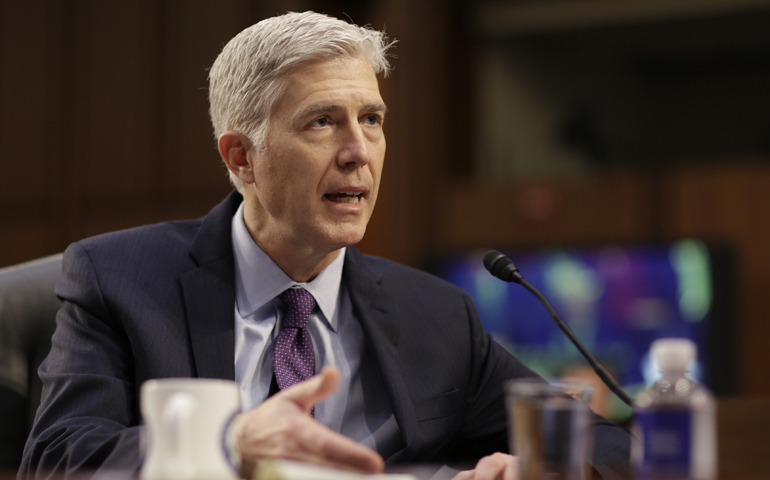
Judge Neil Gorsuch testifies during the second day of his Senate Judiciary Committee confirmation hearing March 21 on Capitol Hill in Washington. (CNS/Joshua Roberts, Reuters)
The confirmation hearings for Judge Neil Gorsuch were preempted on Monday by the concurrent hearing featuring FBI Director James Comey, who did a little confirming himself: Yes, there is an investigation into ties between Russia and the Trump campaign and, no, President Obama never ordered surveillance of Trump Tower. Wednesday, the confirmation hearings were largely preempted by coverage of the terrorist attack in London.
They could have preempted Tuesday and Thursday as well. The hearings were truly boring, which is good for Gorsuch's prospects to join the Supreme Court later this spring. The losers at the hearings have been the senators.
Democrats complained that Gorsuch did not reveal very much about his judicial philosophy nor answer some of their questions on specific issues. In fact, his answers were not far different from those offered previously by Justices Elena Kagan and Sonia Sotomayor at their confirmation hearings.
Republicans seemed to take umbrage that anyone would question the nomination because Gorsuch is so obviously qualified and received the highest rating from the American Bar Association. To which one can only reply: Judge Merrick Garland was qualified too.
I admit to a huge frustration that President Donald Trump was able to nominate anyone to the court. The decision last year by Senate Majority Leader Mitch McConnell was so thoroughly wrong, it is easy for the Democrats to be looking for some kind of payback. Nothing can undo the wrong done to Judge Garland, nor should Judge Gorsuch have to pay the price for McConnell's extreme partisanship. I stand by my opinion offered at the time the president nominated Gorsuch: "He should be confirmed. And, Democrats should save their fire for when Trump acts like a petulant child or a petty tyrant. In this case, the president acted like a president." The Democrats should look for a way to punish McConnell, not Gorsuch, and certainly not mimic McConnell, no matter how tempting it may be in this case.
Related: Democrats in Senate plan to filibuster Gorsuch's nomination (March 23, 2017)
I do want to revisit the words that immediately preceded that conclusion however. I wrote: "Judge Gorsuch would not have been my choice. I am sure he would not have been selected by any Democratic president. But, for most of our history, a disagreement over judicial philosophy has not been sufficient to justify a negative vote against a qualified nominee. No one is questioning Judge Gorsuch's credentials. He is not outside the mainstream of judicial thought." It is time to stop the charade that says a nominee's judicial philosophy should not be at issue in the decision to vote to confirm, only their competence. In fact, their philosophy should be the primary issue.
Yet, for all of my adult lifetime, saying you were voting against a nominee because you disagreed with her was considered bad form. The Democrats stopped the nomination of Judge Robert Bork by painting him as a racist, which he wasn't, instead of simply saying that he was wrong about the role of the federal government in attacking racism, which he was. Douglas Ginsburg had to withdraw his nomination not because he subscribed to an arch-conservative judicial philosophy but because he had smoked pot. Republicans played rhetorical twister in efforts to justify voting against Sotomayor, which thirty-one of them did, claiming she was not qualified when, in fact, they just did not agree with her judicial philosophy.
The need for a different reason from philosophic disagreement to oppose a nomination is not written into the Constitution. What is meant by "advice and consent" is not specified. Still, we have this strange charade in which we do opposition research to find some personal dirt to justify a vote against someone when the only real reason we want to vote against the person is that we think they are wrong. The whole thing becomes a charade and we now, in 2017, can no longer ignore the fact that charades are bad for democracies.
One of the reasons our nation has ended up with a serial liar as our president is because of the many ways that some degree of deceit has filtered into our governing processes and decisions. Politicians can't honestly address the downside of their proposals for fear that will lead the news and no one will hear the upside. So, in the days leading to the vote for the Affordable Care Act, President Obama had to promise what it was not his to promise, that all Americans could keep their health insurance plans if they wanted to. President George W. Bush's administration promised us that the Iraq War would be a cakewalk, we would be greeted as liberators, and it was ridiculous to suggest the whole thing could not be done for less than $100 billion. President Bill Clinton did not have sex with that woman. And, so on. None of this skirting of the truth comes close to the level of deceit we see from the incumbent president, but the door was open.
So, here is my proposal to the Democrats. Vote for Judge Gorsuch but let it be known that henceforth, opposition to a nominee's judicial philosophy will be enough to justify a negative vote. Nominees may still obfuscate about sensitive issues, to be sure. But, at least the rationale put forward by the legislative branch, elected by the people, will be based on the real reasons, not the fake ones, and we might even get less ideologically committed judicial nominees to boot.
[Michael Sean Winters is NCR Washington columnist and a visiting fellow at The Catholic University of America's Institute for Policy Research and Catholic Studies.]



